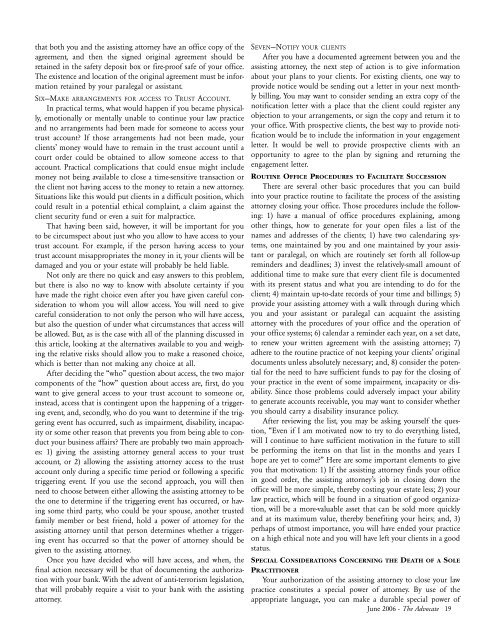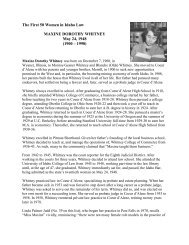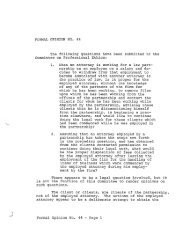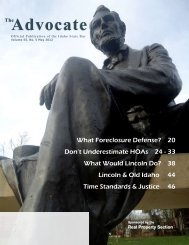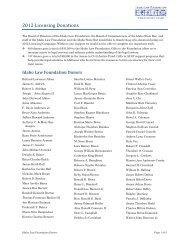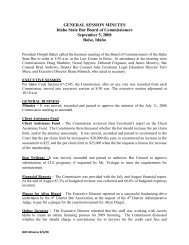The Advocate - June 2006 - Idaho State Bar - Idaho.gov
The Advocate - June 2006 - Idaho State Bar - Idaho.gov
The Advocate - June 2006 - Idaho State Bar - Idaho.gov
Create successful ePaper yourself
Turn your PDF publications into a flip-book with our unique Google optimized e-Paper software.
that both you and the assisting attorney have an office copy of the<br />
agreement, and then the signed original agreement should be<br />
retained in the safety deposit box or fire-proof safe of your office.<br />
<strong>The</strong> existence and location of the original agreement must be information<br />
retained by your paralegal or assistant.<br />
SIX–MAKE ARRANGEMENTS FOR ACCESS TO TRUST ACCOUNT.<br />
In practical terms, what would happen if you became physically,<br />
emotionally or mentally unable to continue your law practice<br />
and no arrangements had been made for someone to access your<br />
trust account? If those arrangements had not been made, your<br />
clients’ money would have to remain in the trust account until a<br />
court order could be obtained to allow someone access to that<br />
account. Practical complications that could ensue might include<br />
money not being available to close a time-sensitive transaction or<br />
the client not having access to the money to retain a new attorney.<br />
Situations like this would put clients in a difficult position, which<br />
could result in a potential ethical complaint, a claim against the<br />
client security fund or even a suit for malpractice.<br />
That having been said, however, it will be important for you<br />
to be circumspect about just who you allow to have access to your<br />
trust account. For example, if the person having access to your<br />
trust account misappropriates the money in it, your clients will be<br />
damaged and you or your estate will probably be held liable.<br />
Not only are there no quick and easy answers to this problem,<br />
but there is also no way to know with absolute certainty if you<br />
have made the right choice even after you have given careful consideration<br />
to whom you will allow access. You will need to give<br />
careful consideration to not only the person who will have access,<br />
but also the question of under what circumstances that access will<br />
be allowed. But, as is the case with all of the planning discussed in<br />
this article, looking at the alternatives available to you and weighing<br />
the relative risks should allow you to make a reasoned choice,<br />
which is better than not making any choice at all.<br />
After deciding the “who” question about access, the two major<br />
components of the “how” question about access are, first, do you<br />
want to give general access to your trust account to someone or,<br />
instead, access that is contingent upon the happening of a triggering<br />
event, and, secondly, who do you want to determine if the triggering<br />
event has occurred, such as impairment, disability, incapacity<br />
or some other reason that prevents you from being able to conduct<br />
your business affairs? <strong>The</strong>re are probably two main approaches:<br />
1) giving the assisting attorney general access to your trust<br />
account, or 2) allowing the assisting attorney access to the trust<br />
account only during a specific time period or following a specific<br />
triggering event. If you use the second approach, you will then<br />
need to choose between either allowing the assisting attorney to be<br />
the one to determine if the triggering event has occurred, or having<br />
some third party, who could be your spouse, another trusted<br />
family member or best friend, hold a power of attorney for the<br />
assisting attorney until that person determines whether a triggering<br />
event has occurred so that the power of attorney should be<br />
given to the assisting attorney.<br />
Once you have decided who will have access, and when, the<br />
final action necessary will be that of documenting the authorization<br />
with your bank. With the advent of anti-terrorism legislation,<br />
that will probably require a visit to your bank with the assisting<br />
attorney.<br />
SEVEN–NOTIFY YOUR CLIENTS<br />
After you have a documented agreement between you and the<br />
assisting attorney, the next step of action is to give information<br />
about your plans to your clients. For existing clients, one way to<br />
provide notice would be sending out a letter in your next monthly<br />
billing. You may want to consider sending an extra copy of the<br />
notification letter with a place that the client could register any<br />
objection to your arrangements, or sign the copy and return it to<br />
your office. With prospective clients, the best way to provide notification<br />
would be to include the information in your engagement<br />
letter. It would be well to provide prospective clients with an<br />
opportunity to agree to the plan by signing and returning the<br />
engagement letter.<br />
ROUTINE OFFICE PROCEDURES TO FACILITATE SUCCESSION<br />
<strong>The</strong>re are several other basic procedures that you can build<br />
into your practice routine to facilitate the process of the assisting<br />
attorney closing your office. Those procedures include the following:<br />
1) have a manual of office procedures explaining, among<br />
other things, how to generate for your open files a list of the<br />
names and addresses of the clients; 1) have two calendaring systems,<br />
one maintained by you and one maintained by your assistant<br />
or paralegal, on which are routinely set forth all follow-up<br />
reminders and deadlines; 3) invest the relatively-small amount of<br />
additional time to make sure that every client file is documented<br />
with its present status and what you are intending to do for the<br />
client; 4) maintain up-to-date records of your time and billings; 5)<br />
provide your assisting attorney with a walk through during which<br />
you and your assistant or paralegal can acquaint the assisting<br />
attorney with the procedures of your office and the operation of<br />
your office systems; 6) calendar a reminder each year, on a set date,<br />
to renew your written agreement with the assisting attorney; 7)<br />
adhere to the routine practice of not keeping your clients’ original<br />
documents unless absolutely necessary; and, 8) consider the potential<br />
for the need to have sufficient funds to pay for the closing of<br />
your practice in the event of some impairment, incapacity or disability.<br />
Since those problems could adversely impact your ability<br />
to generate accounts receivable, you may want to consider whether<br />
you should carry a disability insurance policy.<br />
After reviewing the list, you may be asking yourself the question,<br />
“Even if I am motivated now to try to do everything listed,<br />
will I continue to have sufficient motivation in the future to still<br />
be performing the items on that list in the months and years I<br />
hope are yet to come?” Here are some important elements to give<br />
you that motivation: 1) If the assisting attorney finds your office<br />
in good order, the assisting attorney’s job in closing down the<br />
office will be more simple, thereby costing your estate less; 2) your<br />
law practice, which will be found in a situation of good organization,<br />
will be a more-valuable asset that can be sold more quickly<br />
and at its maximum value, thereby benefiting your heirs; and, 3)<br />
perhaps of utmost importance, you will have ended your practice<br />
on a high ethical note and you will have left your clients in a good<br />
status.<br />
SPECIAL CONSIDERATIONS CONCERNING THE DEATH OF A SOLE<br />
PRACTITIONER<br />
Your authorization of the assisting attorney to close your law<br />
practice constitutes a special power of attorney. By use of the<br />
appropriate language, you can make a durable special power of<br />
<strong>June</strong> <strong>2006</strong> - <strong>The</strong> <strong>Advocate</strong> 19


